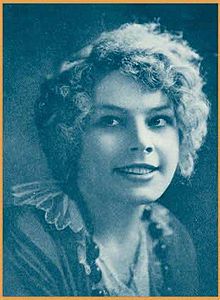This article includes a list of references, related reading, or external links, but its sources remain unclear because it lacks inline citations. (July 2014) |
Cleo Ridgely-Horne (born Freda Cleo Helwig, May 12, 1893[1] – August 18, 1962) was a star of silent and sound motion pictures. Her career began early in the silent film era, in 1911, and continued for forty years. She retired in the 1930s but later returned to make more movies. Her final film was Hollywood Story (1951), in which she had a bit part.
Cleo Ridgely | |
|---|---|
 Ridgely in 1916 | |
| Born | Freda Cleo Helwig May 12, 1893 New York City, U.S. |
| Died | August 18, 1962 (aged 69) Glendale, California, U.S. |
| Occupation | Actress |
| Years active | 1911–1951 |
| Spouse(s) | Jaudon M. Ridgely (div. 1916) James W. Horne |
| Children | 2 |
Early life
editRidgely was born Freda Cleo Helwig in New York City. She was the daughter of August Helwig and Catherine Emily Sommerkamp. She had two sisters, Christina and Martha.[citation needed] After her parents' deaths when she was 2 years old, she lived in Wisconsin with her grandmother.[2]
Career
editBefore she began working in films, Ridgely performed in the chorus at the Hippodrome Theater in New York City. In 1910, she began acting for the Kalem Company film studio in Jacksonville, Florida. After that, she worked for the Lubin and Rex studios.[3]
Ridgely starred with Ruth Roland in a girl detective series in the 1920s and co-starred in a number of films with Wallace Reid and Lew Cody.
Ridgely worked with Famous Players–Lasky Film Company and also for Paramount Pictures. She was selected queen of the Auburn exhibit at the downtown automobile show in Los Angeles in October 1915. A publicity photo posed the actress with a 1916 Auburn Six. It was made by the Auburn Automobile Company and appeared at the show.
Equestrian
editRidgely was an accomplished horsewoman. In 1912, accompanied by her first husband, she rode across the country on horseback from New York to Los Angeles.[3] Making numerous promotional stops along the way, the trip lasted 18 months.[citation needed] In one of her Lasky features she stopped a runaway four-in-hand, risking her life, while on top of a stagecoach.[4] Ridgely lived her later years in Glendale, California.
According to the magazine Kalem Kalendar (January, 1915), during a trip over the Arizona borderline, Ridgely was captured by Mexican rebels. Fortunately, some American citizens heard of the incident and secured her release a few hours later.
In 2016, Ridgely was honored with a Letter of Commendation by the City of Glendale, California.
Personal life
editShe was divorced from her first husband, Jaudon M. Ridgely, in Los Angeles in December 1916. She was then married to James W. Horne, who directed the Laurel and Hardy comedies for many years. Horne died in 1942.[citation needed] She and Horne had twins, Jimmy Horne Jr. and June Jessamine Horne.[5]
Death
editRidgely died in 1962 at her home at the age of 69. She was buried in Forest Lawn Memorial Park.[citation needed]
Partial filmography
edit- Leaves in the Storm (1912)
- The Spoilers (1914)
- Stolen Goods (1915)
- The Fighting Hope (1915)
- The Puppet Crown (1915)
- The Marriage of Kitty (1915)
- The Chorus Lady (1915)
- The Golden Chance (1915)
- The Love Mask (1916)
- The Selfish Woman (1916)
- The House with the Golden Windows (1916)
- The Victory of Conscience (1916)
- The Yellow Pawn (1916)
- The Victoria Cross (1916)
- Joan the Woman (1916)
- The Law and the Woman (1922)
- The Forgotten Law (1922)
- Dangerous Pastime (1922)
- The Sleepwalker (1922)
- The Beautiful and Damned (1922)
References
edit- ^ "Wild scenes in 'The Love Mask'". Pittsburg Kansan. Kansas, Pittsburg. May 6, 1916. p. 2. Retrieved April 2, 2020 – via Newspapers.com.
- ^ Gaddis, Pearl (August 1916). "The Girl Who Rode Across the Continent". Motion Picture Classic. II (6): 33–34. Retrieved April 2, 2020.
- ^ a b Birchard, Robert S. (2009). Cecil B. DeMille's Hollywood. University Press of Kentucky. ISBN 978-0-8131-3829-9. Retrieved April 2, 2020.
- ^ "What's the Price of Film Stardom? Cleo Ridgely Says, 'Defiance of Death'". The Leavenworth Post. Kansas, Leavenworth. April 11, 1916. p. 7. Retrieved April 2, 2020 – via Newspapers.com.
- ^ "The Heavenly Twins". Photoplay. XIII (6): 27. May 1918. Retrieved April 2, 2020.
- Lima, Ohio, Times-Democrat, What's The Price of Film Stardom? Cleo Ridgely Says, Defiance of Death, Saturday Evening, May 6, 1916, Page 9.
- Los Angeles Times, Cleo Ridgely To Be Auburn Queen at Broadway Show, September 19, 1915, Page VII.
- Los Angeles Times, Pen Points, December 10, 1916, Page II4.
- Los Angeles Times, Rites Set Today for Mrs. Horne, Former Actress, August 21, 1962, Page 21.
- Los Angeles Times, The Week In Review, August 26, 1962, Page GB2.
- 1930 United States Census